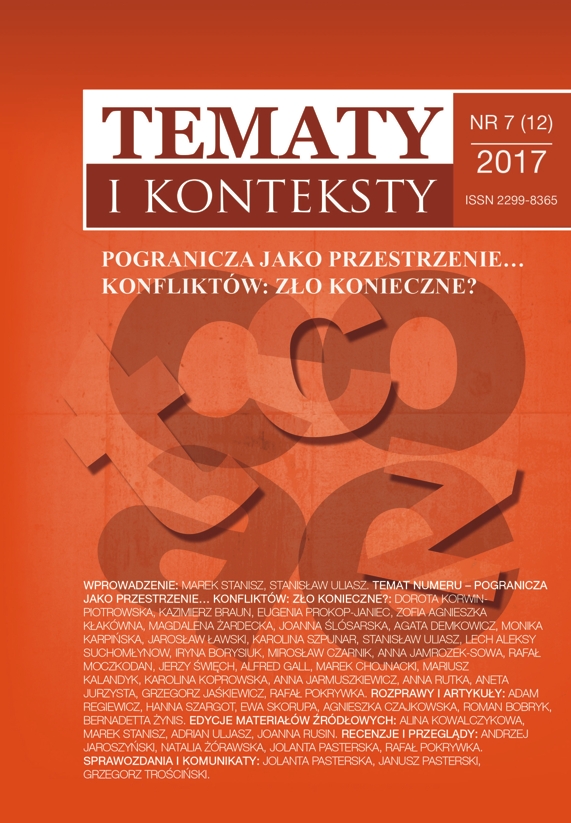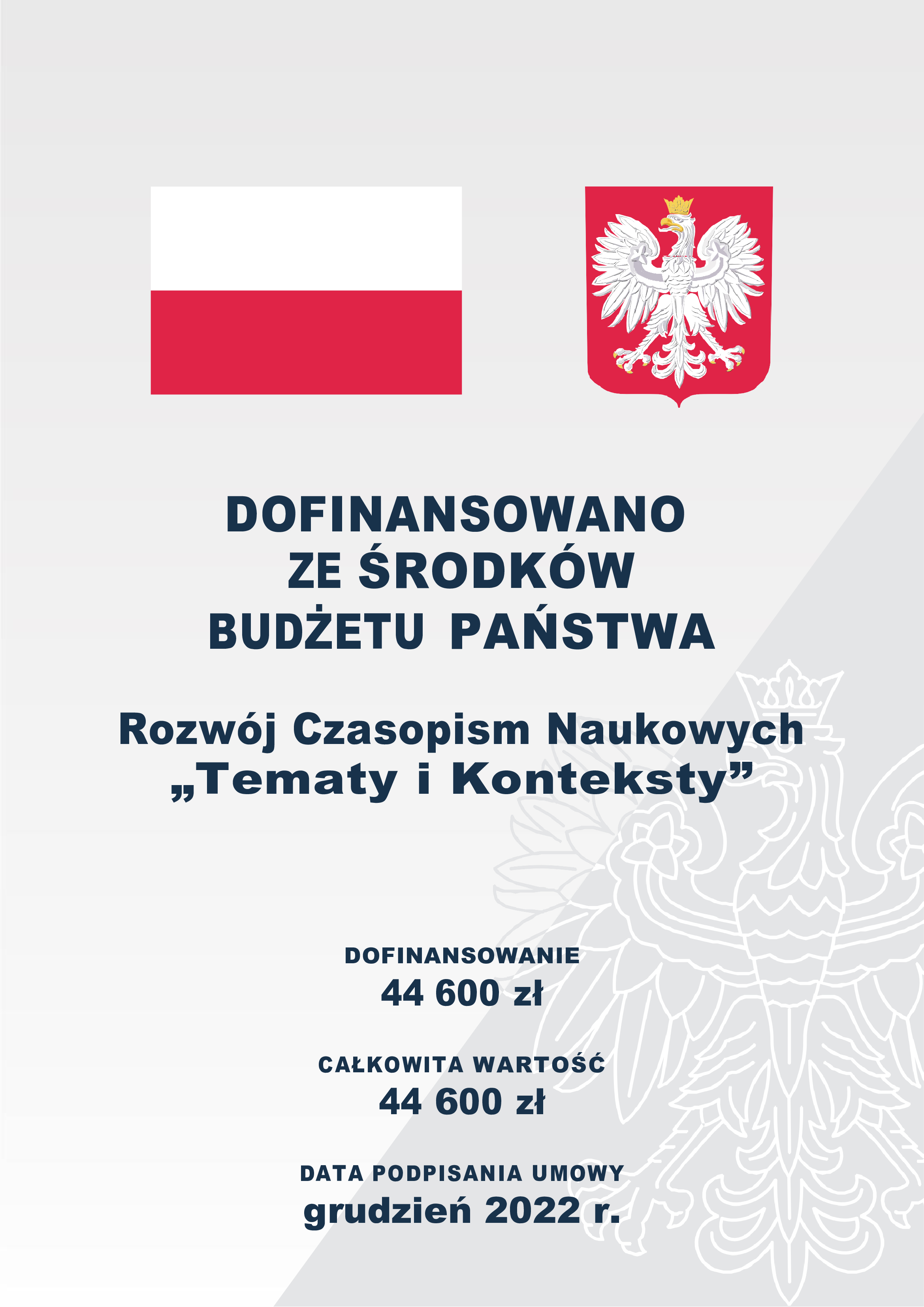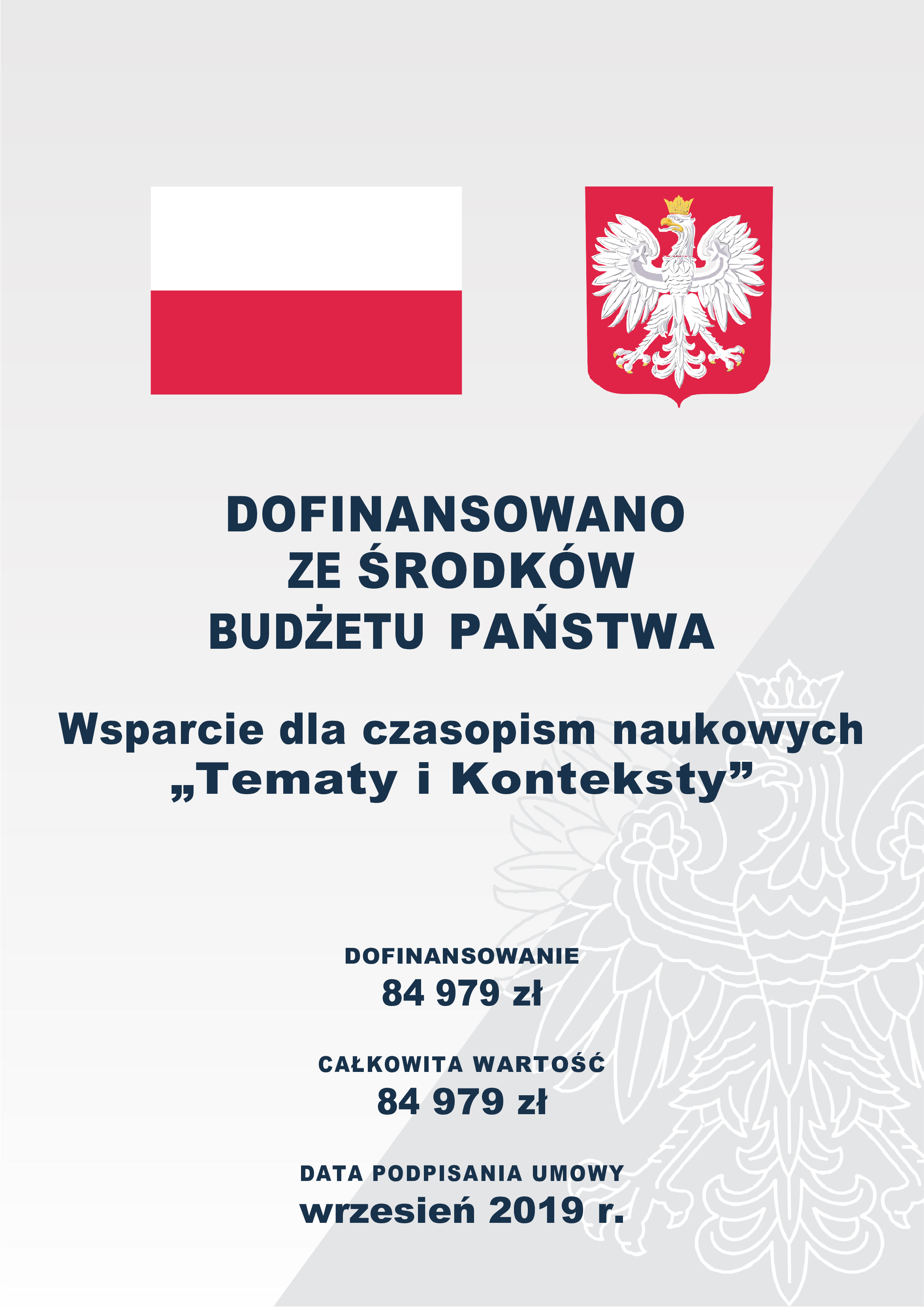Three Metaphors of Exile in the Modern German Novel: Gehen, ging, gegangen by Jenny Erpenbeck, Ohrfeige by Abbas Khider, Das Mädchen mit dem Fingerhut by Michael Köhlmeier
DOI:
https://doi.org/10.15584/tik.2017.27Keywords:
migrant literature, metaphor, postcolonial discourse, critical receptionAbstract
The paper is divided into three parts. In the first one the most popular contexts of the research of the migrant literature are named: the actual debate about consequences of migrant policy and the figure of the author. In the second part three central metaphors in the novels of Erpenbeck, Khider and Köhlmeier are presented. These metaphors of exile are: disturbed time, lost life story, incomprehensible language. The third part contains an overview of the reception of the novels in Germany. The conventions of reading focus first of all on the two aforementioned non-fictional references (political context and author) without taking the metaphorical power of the texts into account. Thus the new migrant literature tends to become an equivalent for journalism and is read literally as a testimony of the author.
Downloads
References
Adelson L. A., Against Between – Ein Manifest gegen das Dazwischen, übers. von K. E. Yeşilada, „Text+Kritik“ 2006, IX, S. 36–46.
Apel F., Wir werden sichtbar, „Frankfurter Allgemeine Zeitung“, Nr. 198, 27.08.2015, S. 10.
Aydemir F., Eine Sachbearbeiterin wird gefesselt, http://www.taz.de/!5270464/ [06.11.2016].
Badzura J. K., Von Willkommenskultur, Verstehensproblemen und Flüchtlingsquallen, http://literaturkritik.de/public/rezension.php?rez_id=21705 [06.11.2016].
Becker S., Transnational, interkulturell und inter-disziplinär: Das Akkulturationsparadigma der Exilforschung, [in:] D. Bischoff, S. Komfort-Hein (Hrsg.), Literatur und Exil. Neue Perspektiven, Berlin 2013, S. 49–69.
Binder E., B. Mertz-Baumgartner, Exilliteratur – Diasporaliteratur – Migrationsliteratur. Einführende Bemerkungen, [in:] E. Binder, B. Mertz-Baumgartner, Migrationsliteraturen in Europa, Innsbruck 2012, S. 9–17.
Birrer S., Gestrandet in der Warteschlaufe, „Neue Zürcher Zeitung“, Nr. 235, 10.10.2015, S. 25.
Blume P., Fiktion und Weltwissen. Der Beitrag nichtfiktionaler Konzepte zur Sinnkonstitution fiktionaler Erzählliteratur, Berlin 2004.
Buchzik D., Trifft ein Berliner Professor auf Flüchtlinge, http://www.spiegel.de/kultur/literatur/gehen-ging-gegangen-von-jenny-erpenbeck-rezension-a-1050518.html [06.11.2016].
Erpenbeck J., Gehen, ging, gegangen, München 2015.
Fessmann M., Die Blutegel des Unglücks, „Süddeutsche Zeitung“, Nr. 33, 10.02.2016, S. 17.
Foucault M., Die Ordnung des Diskurses, übers. von W. Seitter, Frankfurt a. M. 1993.
Granzin K., Der gute Richard, http://www.taz.de/!5229981/ [06.11.2016].
Granzin K., Der Mensch im Durchgangsland, http://www.fr-online.de/literatur/abbas-khider--ohrfeige--der-mensch-im-durchgangsland,1472266,33723376.html [06.11.2016].
Hermes S., Grenzen der Repräsentation. Zur Inszenierung afrikanisch-europäischer Begegnungen in Jenny Erpenbecks Roman Gehen, ging, gegangen, „Acta Germanica. Jahrbuch des Germanistenverbandes im Südlichen Afrika“ 2016, Nr. 44, S. 179–191.
Ingarden R., Z teorii dzieła literackiego. Dwuwymiarowa budowa dzieła sztuki literackiej, [in:] A. Burzyńska, M. P. Markowski (red.), Teorie literatury XX wieku. Antologia, Kraków 2006, S. 43–72.
Keller M., S. Hammelehle, „Gut gemeint wie die ganze Willkommenskultur“, http://www.spiegel.de/kultur/literatur/bestseller-gehen-ging-gegangen-von-jenny-erpenbeck-a-1055049.html [06.11.2016].
Khider A., Ohrfeige, München 2016.
Köhlmeier M., Das Mädchen mit dem Fingerhut, München 2016.
Krohn C.-D., Die Herausforderungen der Exilliteraturforschung durch die Akkulturationsund Hybridtheorie, [in:] D. Bischoff, S. Komfort-Hein (Hrsg.), Literatur und Exil. Neue Perspektiven, Berlin 2013, S. 23–48.
Lakoff G., Johnson M., Metaphors We Live By, Chicago 2003.
Lühmann H., Ein Roman als Crashkurs in Flüchtlingskunde, http://www.welt.de/kultur/literarischewelt/article145830887/Ein-Roman-als-Crashkurs-in-Fluechtlingskunde.html [06.11.2016].
Magenau J., Ein Stückchen Acker in Ghana, „Süddeutsche Zeitung“, Nr. 199, 31.08.2015, S. 12.
Man P. de, Aesthetic Ideology, Minneapolis 1997.
Man P. de, The Resistance to Theory, Minneapolis 2002.
Mangold I., Ein guter Burger, http://www.zeit.de/2016/06/ohrfeige-abbas-khider [06.11.2016].
Melzer G., Das dunkle Herz des Märchens, „Neue Zürcher Zeitung“, Nr. 116, 21.05.2016, S. 29.
Rabinowitz P.J., Before Reading. Narrative Conventions and the Politics of Interpretation, Columbus 1998.
Schneider W., Wolfskinder und Mitleidshexen, „Frankfurter Allgemeine Zeitung“, Nr. 64, 16.03.2016, S. 10.
Spiegel H., Das Land, wo Hass und Honig fließen, „Frankfurter Allgemeine Zeitung“, Nr. 29, 4.02.2016, S. 12.
Ster nbu r g J. von, Da s niedlic he kle ine Kind, ht t p://w w w.f r - on l i ne.de/literatur/michael-koehlmeier---das-maedchen-mit-dem-fingerhut--das-niedliche-kleine-kind,1472266,33673646.html [06.11.2016].
Sternburg J. von, Jedermann und die Afrikaner, http://www.fr-online.de/deutscher-buchpreis/jenny-erpenbeck--gehen--ging--gegangen--jedermann-und-die-afrikaner,24520012,31836132.html [06.11.2016].
Weinrich H., Sprache in Texten, Stuttgart 1976.
Winkels H., Ohne Sprache unbehaust, http://w w w.zeit.de/2016/23/das-maedchen-mit-dem-fingerhut-michael-koehlmeier-roman [06.11.2016].
Downloads
Published
How to Cite
Issue
Section
License
Copyright (c) 2017 Tematy i Konteksty

This work is licensed under a Creative Commons Attribution-NonCommercial-NoDerivatives 4.0 International License.




